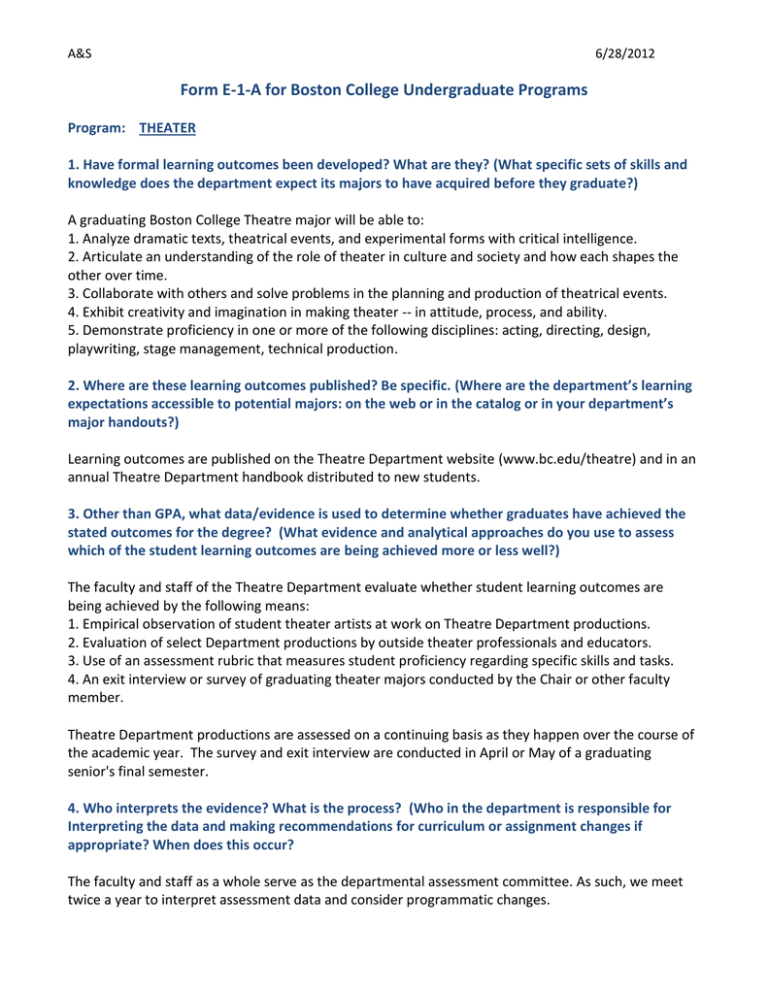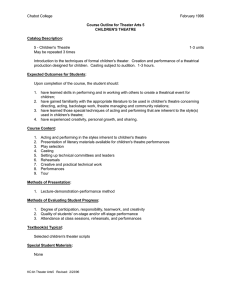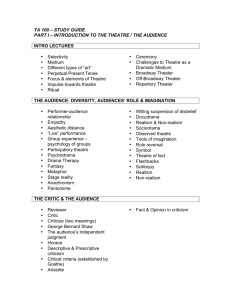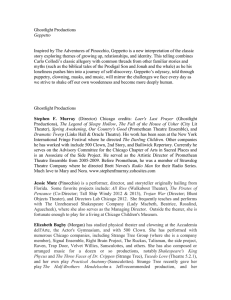Form E-1-A for Boston College Undergraduate Programs
advertisement

A&S 6/28/2012 Form E-1-A for Boston College Undergraduate Programs Program: THEATER 1. Have formal learning outcomes been developed? What are they? (What specific sets of skills and knowledge does the department expect its majors to have acquired before they graduate?) A graduating Boston College Theatre major will be able to: 1. Analyze dramatic texts, theatrical events, and experimental forms with critical intelligence. 2. Articulate an understanding of the role of theater in culture and society and how each shapes the other over time. 3. Collaborate with others and solve problems in the planning and production of theatrical events. 4. Exhibit creativity and imagination in making theater -- in attitude, process, and ability. 5. Demonstrate proficiency in one or more of the following disciplines: acting, directing, design, playwriting, stage management, technical production. 2. Where are these learning outcomes published? Be specific. (Where are the department’s learning expectations accessible to potential majors: on the web or in the catalog or in your department’s major handouts?) Learning outcomes are published on the Theatre Department website (www.bc.edu/theatre) and in an annual Theatre Department handbook distributed to new students. 3. Other than GPA, what data/evidence is used to determine whether graduates have achieved the stated outcomes for the degree? (What evidence and analytical approaches do you use to assess which of the student learning outcomes are being achieved more or less well?) The faculty and staff of the Theatre Department evaluate whether student learning outcomes are being achieved by the following means: 1. Empirical observation of student theater artists at work on Theatre Department productions. 2. Evaluation of select Department productions by outside theater professionals and educators. 3. Use of an assessment rubric that measures student proficiency regarding specific skills and tasks. 4. An exit interview or survey of graduating theater majors conducted by the Chair or other faculty member. Theatre Department productions are assessed on a continuing basis as they happen over the course of the academic year. The survey and exit interview are conducted in April or May of a graduating senior's final semester. 4. Who interprets the evidence? What is the process? (Who in the department is responsible for Interpreting the data and making recommendations for curriculum or assignment changes if appropriate? When does this occur? The faculty and staff as a whole serve as the departmental assessment committee. As such, we meet twice a year to interpret assessment data and consider programmatic changes. A&S 6/28/2012 5. What changes have been made as a result of using the data/evidence? (Have there been any recent changes to your curriculum or program? Why were they made?) Changes are under consideration pending the most recent interpretation of assessment data. At present, no significant programmatic changes are in the process of being implemented. 6. What evidence do you have that the changes have resulted in improved learning outcomes? None as of yet. Changes are pending (see above). 7. Date of the most recent program review. (Your latest comprehensive departmental self-study and external review.) The Theatre's most recent Academic Program Review commences in June 2012 and will be completed by the end of the 2012-2013 academic year.






